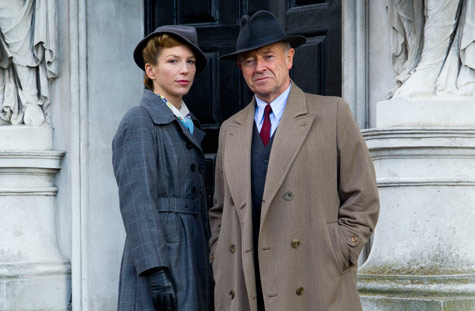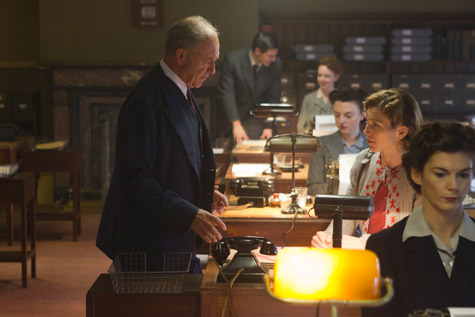
Inside a lovely home, a phone rings. A woman answers it. She listens for a moment, says two words into the receiver, places it back in the cradle, picks up a briefcase and a passport and slips out the door before her husband looks up from his afternoon paper to notice she’s gone.
What begins as a scene of ordinary domesticity turns into something else. And that’s the point. The end of World War II brought an end to “life as we know it” in England. All the things people were sure of before the war—being able to trust their neighbors, for instance—are uncertain now.
“Do I need to remind you how much you can trust me?” Foyle asks Arthur Valentine late in this episode.
It couldn’t hurt, but it probably won’t mean much to an intelligence officer like Valentine. From where he sits, this is a suspicious world; no one can be trusted and everyone has an ulterior motive. He’s not the only one who feels this way.
Three high-ranking Russian defectors have been murdered. All were garroted in the same way; all had been living in MI5 safe houses. Someone with inside information is behind this. Someone with inside information can’t be trusted… No one is surprised.
But what does this have to do with the woman in the first scene? And what does it have to do with the blood-soaked man who collapses at the door of a hospital, utters one cryptic word—possibly in Russian—and dies before the doctor can revive him?
Down the road from the hospital is a place called Barton Hall. It used to be an Army base, a nurse tells Foyle. He asks what it is now. She has no idea, and she gives the impression she might be better off not knowing.
Foyle isn’t so easily dissuaded.
He soon learns that Barton Hall is still a military facility, only now it’s used to “eavesdrop on Soviet radio traffic.” In its basement? “Just a tangle of wires and little boxes that beep,” he is told. As if Foyle would believe that! There’s something not right about Barton Hall, and Foyle is going to find out what it is.

Sam, on the other hand, is having a harder time coping with the environment of mistrust and can’t manage to keep her chattiness in check. This is more than ever an occupational hazard now that she’s officially employed as Foyle’s assistant. It’s slightly less of a problem as she campaigns alongside Adam, who’s now a Labour Party candidate for their local district. (National Health is proving to be a tough sell. Go figure.)
As always, Foyle’s War delivers on the details, not merely about clothes and shoes and military procedures, but also about the way people thought and felt. For me, this episode, written by David Kane, captured the sense of displacement people must have had immediately following the war. First there were those who literally had been displaced because their homes were destroyed during the war. Then there was the community as a whole aching for life to return to normal; wishing they could go to the butcher’s or buy a decent loaf of bread. We meet them both.
Their faith in the system has been shaken. They’re disappointed. What they relied on and knew to be true, might not be true any longer.
It’s a hard lesson to learn that you can’t count on people. Except Foyle, of course. We can always count on Foyle.
The next episode of Foyle’s War airs on Masterpiece Mystery next week.
Leslie Gilbert Elman is the author of Weird But True: 200 Astounding, Outrageous, and Totally Off the Wall Facts. Follow her on Twitter @leslieelman.
Read all of Leslie Gilbert Elman’s posts for Criminal Element.

Thanks for the review. I so agree that this episode painfully evokes the feeling of displacement that people experienced after the war. Even Sam with her chattiness is not her old bubbly self, she’s got worries. But glimmers of the old Sam appear and you are so happy to see them. The complicated story left you with several people to dislike, and those who were supposedly working for the government. This series also offers a sharp look at the reality of secret service and those who operate it. Thank goodness we have the Michael Kitchen lovely, honest, honorable and incrdibly savvy character to keep our spirits up.